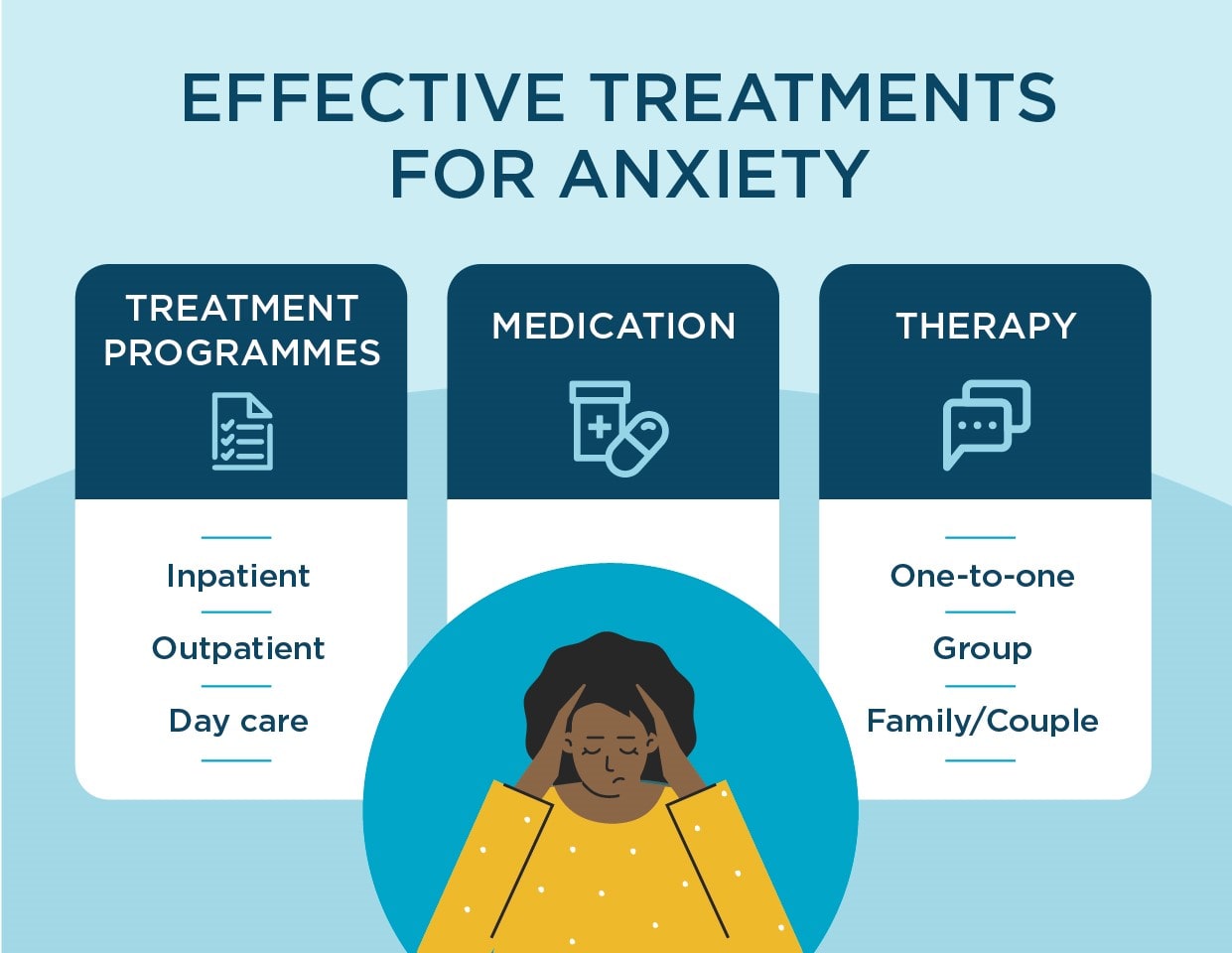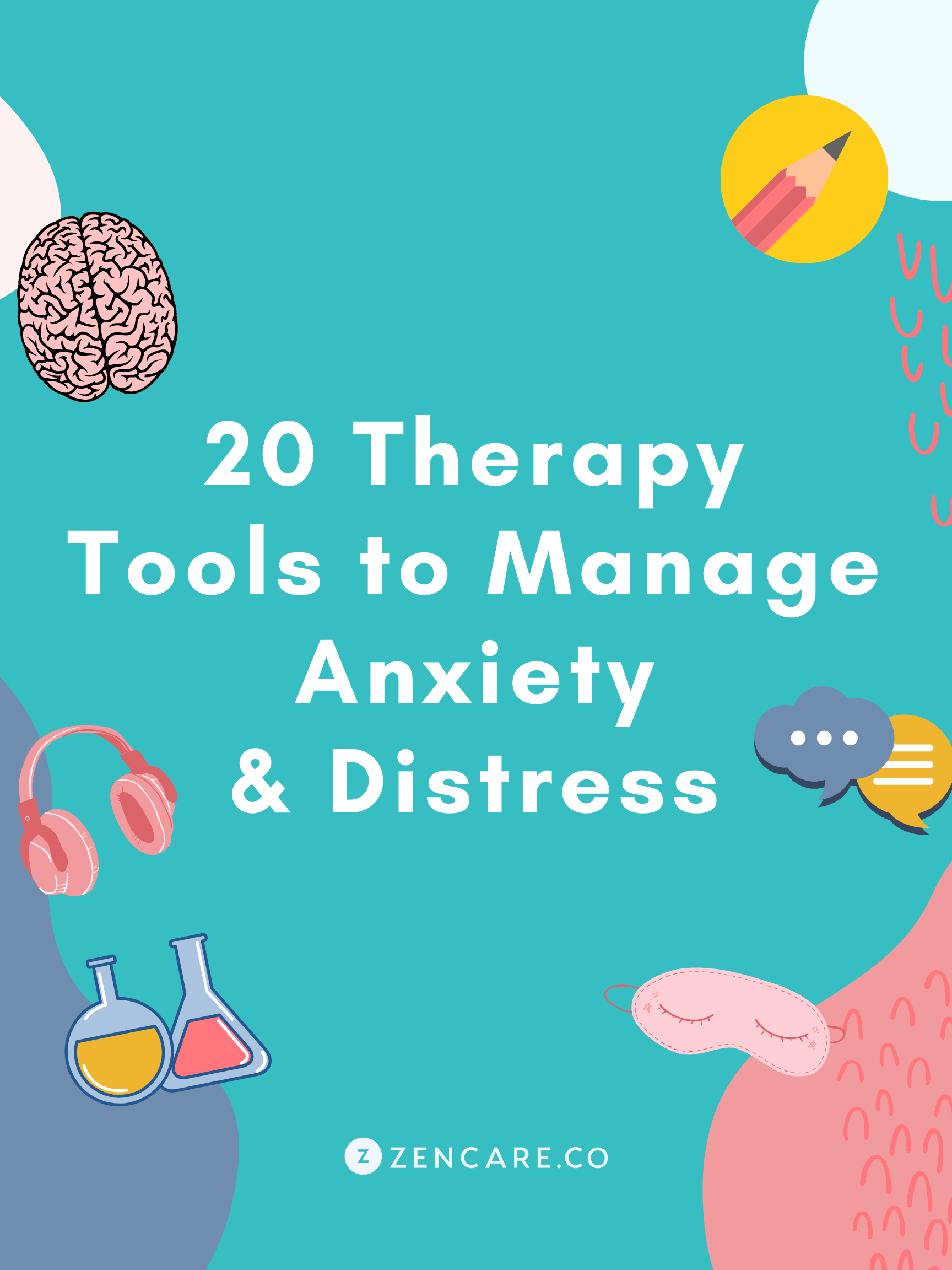Exploring Different Strategies in Counselling for Stress And Anxiety Problem for Lasting Modification
When dealing with anxiousness disorders, it's necessary to explore a range of therapy strategies. Each approach offers special understandings and devices to help you manage your signs successfully. You could locate that combining techniques can produce the most effective outcomes. Nonetheless, recognizing the subtleties of these strategies is essential to promoting enduring modification. What happens if the right combination could launch a brand-new degree of psychological health for you?
Recognizing Anxiousness Problems: A Short Introduction
Stress and anxiety conditions, which impact countless people worldwide, can significantly affect day-to-day life. You might experience frustrating sensations of anxiety or fret that seem unmanageable. These feelings can lead to physical signs and symptoms like an auto racing heart, sweating, or perhaps lightheadedness. Typical sorts of stress and anxiety disorders include generalised anxiousness condition, panic attack, and social anxiety disorder. Each has one-of-a-kind indications, but they all share a propensity to interrupt your routine and relationships.Understanding the source of your stress and anxiety is vital. It could come from genetics, mind chemistry, or life experiences. Acknowledging your triggers can help you handle your reactions better. It is necessary to bear in mind that you're not alone in this battle. Lots of people deal with similar difficulties, and seeking aid is a strong action toward feeling much better. By finding out about anxiousness conditions, you're already on the path to understanding and handling your condition more properly.
Cognitive-Behavioral Therapy: Testing Negative Idea Patterns
In Cognitive-Behavioral Therapy, you'll start by identifying the unfavorable idea sets off that add to your stress and anxiety. Counseling services for anxiety. As soon as you recognize these ideas, you'll function on replacing them with even more favorable alternatives. Together, you'll develop reliable coping strategies to assist manage your anxiousness in everyday circumstances

Recognizing Adverse Thought Triggers
Acknowledging the specific triggers behind your adverse thoughts can be important in taking care of anxiousness when you experience minutes of distress. Begin by taking notice of scenarios that prompt feelings of fear or anxiety. Is it a congested space, a future target date, or a conversation with certain individuals? Write these instances in a journal. This will aid you recognize patterns in your thinking. Notice physical experiences that accompany your unfavorable ideas, like a racing heart or rigidity in your chest. By identifying these triggers, you gain insight right into what's fueling your anxiousness. Understanding these links is the initial step in testing those thoughts and eventually reclaiming control over your emotional actions.
Changing Thoughts With Positives
Challenging adverse thought patterns is a crucial step in transforming your mindset and decreasing anxiousness. You might usually find on your own trapped in cycles of self-doubt or devastating reasoning. Rather of allowing these ideas determine your sensations, practice replacing them with positive affirmations or practical alternatives. For circumstances, when you think, "I can't handle this," move it to, "I can handle obstacles one step at once." This easy modification can substantially influence your emotion. Frequently determining and responding to these unfavorable ideas assists produce a healthier interior dialogue. Keep in mind, it takes some time and effort, however constantly practicing this method can result in long lasting modification, equipping you to face anxiety with renewed self-confidence and strength.
Building Coping Strategies With Each Other

Mindfulness and Acceptance-Based Approaches: Growing Present-Moment Awareness
As you navigate the complexities of stress and anxiety, integrating mindfulness and acceptance-based strategies can substantially boost your capacity to grow present-moment understanding. By concentrating on the present moment, you'll find that you can observe your ideas and sensations without judgment. This method assists you acknowledge your anxiety without really feeling bewildered by it.Engaging in mindfulness exercises, such as deep breathing, body scans, or directed meditations, permits you to ground on your own in your present experience. Acceptance-based techniques encourage you to welcome your feelings instead of fight versus them. They shed their power over you.Incorporating these methods into your day-to-day routine can transform just how you respond to anxiety when you approve your feelings. You'll develop strength and discover to navigate demanding circumstances with greater convenience. Inevitably, cultivating present-moment recognition lays the structure for long lasting adjustment, equipping you to lead a more satisfying life.
Exposure Treatment: Facing Anxieties Slowly
Exposure therapy helps you face your worries in a steady way, making it less overwhelming. You'll learn methods to encounter anxiety-provoking circumstances detailed, while also building coping methods to handle your reactions (Counseling this post services for anxiety). This approach encourages you to take control and lower anxiety gradually
Gradual Exposure Strategies
When facing anxiousness, slowly challenging your concerns can be a powerful method to regain control. This technique, understood as gradual exposure, entails slowly revealing on your own to the situations or objects that cause your anxiety. Beginning with less challenging scenarios and gradually work your way as much as more tough ones. If you're terrified of public talking, you may start by talking in front of a mirror, after that proceed to sharing ideas with a friend, and eventually resolve a little team. Each action aids desensitize you to the worry, building your confidence in time. Remember, it's important to pace on your own and celebrate tiny triumphes as you move with this process, reinforcing your capacity to take care of anxiousness properly.
Building Coping Approaches
Structure efficient coping methods is crucial for managing anxiety, especially as you challenge your concerns progressively. One powerful approach is direct exposure treatment, where you begin by encountering your worries in a regulated manner. Start with less daunting situations and slowly work your method up to more tough situations. This gradual direct exposure assists desensitize you to anxiousness causes, making them less overwhelming.Incorporate relaxation methods, such as deep breathing or mindfulness, to soothe your mind during exposure. Track your progress, celebrating little success in the process to enhance your self-confidence. Bear in mind, it's alright to take your time; the objective isn't excellence but stable improvement. By building these approaches, you'll empower on your own to navigate anxiousness and accept life extra completely.
Psychodynamic Treatment: Uncovering Origin of Stress And Anxiety
Psychodynamic treatment explores the subconscious mind, disclosing the root triggers of your anxiety. By analyzing your ideas, feelings, and previous experiences, this method helps you discover underlying disputes and unsolved concerns that might add to your current stress and anxiety. You'll work with more a therapist to check out childhood experiences, relationships, and psychological patterns that form your feedbacks today.As you obtain insight into these deeper layers of your mind, you'll start to identify just how previous occasions affect your existing habits. This understanding can bring about catharsis, permitting you to process feelings you may have suppressed.Through the restorative connection, you can additionally recognize defense mechanisms that may have established over time, offering a more clear path to alter. Eventually, psychodynamic treatment furnishes you with the devices to resolve your anxiousness at its core, promoting lasting makeover in your emotional wellness.
Alternative and integrative Techniques: Integrating Methods for Greater Effectiveness
Incorporating different therapeutic techniques can enhance your journey towards managing stress and anxiety better (Counseling services for anxiety). By combining aspects from cognitive-behavioral treatment, mindfulness practices, and holistic approaches, you can develop a tailored approach that addresses your one-of-a-kind requirements. You may use cognitive-behavioral methods to test unfavorable idea patterns while including mindfulness workouts to ground yourself in the present moment.Additionally, discovering alternative methods such as yoga exercise or meditation can advertise relaxation and minimize stress and anxiety signs and symptoms. This mix permits you to create higher self-awareness and resilience.Experimenting with these varied methods can assist you uncover what reverberates most with you. Remember, it's concerning discovering a harmony that works, instead of sticking to a single approach. This integrative technique not just supplies prompt alleviation yet additionally promotes long-term abilities for taking care of anxiousness, encouraging you to redeem control over your life

The Role of Support Equipments: Structure Resilience Via Link
While it may appear that handling anxiety is a singular trip, having a solid support group can play an important function in your resilience. Surrounding on your own with empathetic close friends, family members, or support system produces a secure area where you can openly share your experiences and feelings. When you get in touch with others, you remind on your own that you're not the only one in this struggle.These relationships supply inspiration and can give functional coping methods that have benefited others. original site It's additionally an opportunity to gain point of view; buddies can assist you see situations differently, decreasing sensations of isolation.Moreover, emotional support promotes a feeling of belonging, which can substantially relieve anxiety signs. By leaning on your support system, you can develop durability and deal with obstacles extra properly. Bear in mind, getting to out for aid suggests toughness, and it can make all the difference in your journey towards handling stress and anxiety.
Often Asked Inquiries

What Are the Typical Symptoms of Anxiousness Conditions?
You could experience restlessness, exhaustion, difficulty focusing, irritability, muscular tissue tension, and rest disturbances. Physical symptoms can include fast heartbeat, sweating, and trembling. Acknowledging these signs early can aid you seek proper assistance and treatment.
How Much Time Does Therapy Typically Last for Anxiousness Disorders?
Treatment for anxiousness problems commonly lasts anywhere from a couple of weeks to numerous months. It actually depends on your private demands, development, and the techniques your therapist makes use of to help you manage your stress and anxiety efficiently.
Can Medicine Be Utilized Alongside Treatment for Stress and anxiety?
Yes, drug can definitely be used along with treatment for anxiety. Incorporating both strategies often improves therapy performance, aiding you take care of symptoms while exploring underlying problems through counseling. Constantly consult your medical care provider for personalized advice.
Are There Self-Help Strategies for Taking Care Of Stress And Anxiety?
Yes, there are several self-help approaches for managing stress and anxiety. You can practice mindfulness, participate in routine workout, preserve a balanced diet plan, establish a routine, and use deep breathing techniques to help in reducing stress and anxiety symptoms successfully.
Exactly how Do I Know if I Required Expert Assistance for Anxiety?
You should take into consideration looking for expert help for anxiety if it interrupts life, causes considerable distress, or if self-help techniques aren't functioning. Trust fund your reactions; connecting can lead to much better coping skills and support. Usual types of stress and anxiety disorders include generalised stress and anxiety problem, panic problem, and social stress and anxiety condition. When you experience moments of distress, acknowledging the specific triggers behind your negative thoughts can be essential in taking care of stress and anxiety. Changing adverse thoughts is just the beginning of managing anxiousness successfully. By examining your thoughts, feelings, and previous experiences, this strategy helps you discover underlying conflicts and unsolved problems that may add to your current anxiousness. It's also a chance to obtain perspective; friends can help you see circumstances in different ways, lowering feelings of isolation.Moreover, psychological assistance promotes a sense of belonging, which can considerably reduce anxiety signs.